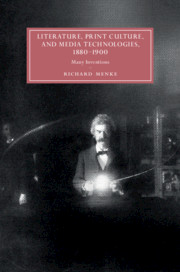Book contents
- Literature, Print Culture, and Media Technologies, 1880–1900
- Cambridge Studies in Nineteenth-Century Literature and Culture
- Literature, Print Culture, and Media Technologies, 1880–1900
- Copyright page
- Contents
- Figures
- Acknowledgments
- Introduction
- Chapter 1 A Message on All Channels
- Chapter 2 Fictions of the Victorian Telephone
- Chapter 3 New Media, New Journalism, New Grub Street
- Chapter 4 The Sinking of the Triple-Decker
- Chapter 5 Writers of Books
- Chapter 6 Words Fail
- Chapter 7 A Connecticut Yankee’s Media Wars
- After Words
- Bibliography
- Notes
- Index
- Cambridge Studies in Nineteenth-Century Literature and Culture
Chapter 2 - Fictions of the Victorian Telephone
The Medium Is the Media
Published online by Cambridge University Press: 30 September 2019
- Literature, Print Culture, and Media Technologies, 1880–1900
- Cambridge Studies in Nineteenth-Century Literature and Culture
- Literature, Print Culture, and Media Technologies, 1880–1900
- Copyright page
- Contents
- Figures
- Acknowledgments
- Introduction
- Chapter 1 A Message on All Channels
- Chapter 2 Fictions of the Victorian Telephone
- Chapter 3 New Media, New Journalism, New Grub Street
- Chapter 4 The Sinking of the Triple-Decker
- Chapter 5 Writers of Books
- Chapter 6 Words Fail
- Chapter 7 A Connecticut Yankee’s Media Wars
- After Words
- Bibliography
- Notes
- Index
- Cambridge Studies in Nineteenth-Century Literature and Culture
Summary
Although Alexander Graham Bell introduced the electric telephone to Britain soon after its invention, it was not quickly adopted there and remained less than ubiquitous in Victorian daily life and literature. But in the 1890s, three fictional tales of young writers—Rudyard Kipling’s “The Finest Story in the World” (1891), Ella Hepworth Dixon’s The Story of a Modern Woman (1894), and George Paston’s A Writer of Books (1898)—all invoke the telephone as they treat the obstacles to literary production. These texts highlight not the device’s technical properties so much as its unexpected ability to embody a new concept: the idea of a media system that fused new communication technologies with print forms created for a mass audience—a version of what would later be called mass media.
Keywords
- Type
- Chapter
- Information
- Literature, Print Culture, and Media Technologies, 1880–1900Many Inventions, pp. 49 - 71Publisher: Cambridge University PressPrint publication year: 2019

